Coinbase’s Nemil Dalal says that coding will change more in the next year than the last 30 thanks to AI.
by Andrew Fenton 8 min November 28, 2024

Imagine building an AI agent on Base that can keep track of all of your crypto transactions and automatically take enough profits so you can stay on top of your USD tax liabilities.
Or an agent that can automatically rebalance your crypto portfolio so that profits are automatically moved into quality coins like Bitcoin, Ethereum and Solana and you don’t end up with 90% shitcoins that you would’ve roundtripped back to zero at the end of the cycle.

Magazine did imagine these things and suggested them to Nemil Dalal, the senior director of the Coinbase Developer Platform, in the hope he could get someone to build them. Base is creating the AI tools necessary so that anyone with a bright idea can build it regardless of technical ability.
That platform is targeting one million devs building on Base, and that’s only going to happen with the assistance of AI coding.
“We’re just scratching the surface of how much productivity they can get, but in like, six or 12 months, I can see really fantastical apps being built in just a matter of a few types of prompts with your AI,” he says.
“I think we’re in a magical era of building. I think software engineering is going to change more in the next year than it has in the last 30 years.”
As it happens Dalal really loves the automatic portfolio rebalancing idea.
“I think it’s another really great example,” Dalal says across the table at a McDonalds in Bangkok, where we’ve been forced to retreat from Base’s noisy “Every AI Agent Needs a Wallet” event nearby.
“I think actually it’s such a good idea that we may put it out in our docs as an example of what people can build,” he says.
Coinbase Developer Platform’s AgentKit
The Coinbase Developer Platform isn’t retail-facing just yet, but its AgentKit infrastructure seems almost easy enough for ordinary people to use. Back at the event, there’s a demonstration as a user logs inm and spins up a Based Agent with a crypto wallet, then performs a transaction. The whole thing takes just a minute or so.

It uses an API key from OpenAI currently, but it’s model agnostic and will also work with Claude or open-source models.
One project building on Base is called Brian Knows AI (no relation to Brian Armstrong). It’s creating a natural language voice interface so you can just ask the AI to do some complicated crypto action, and it’ll carry it out.
“You can basically talk in natural language to your wallet,” explains Dalal. “So, as an example, people may not want to use MetaMask. They may want to just be able to easily in natural language, say, send some money to this person.”
It’s easy to see the potential for that technology to utterly transform the UX for crypto, enabling users with zero idea about private keys and unreadable wallet addresses to enter the space.
Base’s motto is one billion users and one million developers building. Lead contributor Jesse Pollak explains to Magazine that making building simple is key to the L2’s growth strategy.
“From a technology perspective, we’ve helped create a set of tools that make it incredibly easy for people to build with things like onchain kit, the smart wallet, all the emerging AI tools that are letting people build agents and other things. Easy, easy, easy to build and create on Base.”

Build a Warren Buffett agent
Another cool idea the Base team has been discussing is training an agent on the strategies of a real-life investment guru and getting the agent to invest on your behalf.
“We joke about that, but one of the things we’re really excited about is that you can basically train someone on all the writings, let’s say Warren Buffett, and then you can interact with that personality.”
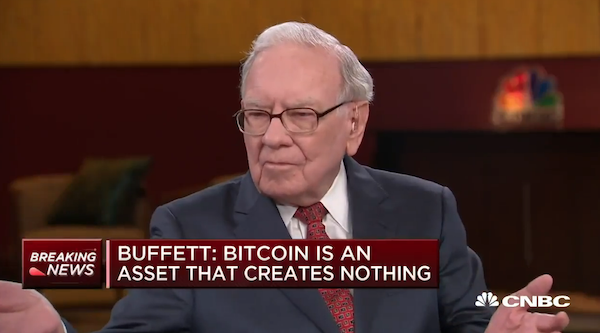
Given Buffett famously labeled Bitcoin “rat poison squared,” he may not be the best choice for crypto investors.
“Maybe in Warren Buffett’s case, he would not be sending you any crypto anytime soon or an NFT, but that’s an example of something that, like, absolutely we can do right now,” Dalal laughs.
A user-built ecosystem is Base’s growth strategy
Both Pollak and Dalal are super enthusiastic and excited about the future of crypto. Given the financial nihilism that’s infected the space and apocalyptic fears over artificial superintelligence, it’s kind of amazing to meet idealists who can see nothing but positives in the intersection of AI and crypto.
Also read: A bizarre cult is growing around AI-created memecoin ‘religions’
Dalal explains that Based Agents only started in earnest about five months ago when Coinbase set out to build the tech needed to give agents’ crypto wallets the ability to transact autonomously.
“We saw what was happening with OpenAI, and none of them were onchain. Agents, all of them, were independent of the blockchain,” he says, adding that as agents can’t get bank accounts, the mission became to overcome the technical obstacles that prevented agents from using crypto wallets.
“So that’s how we started building and basically we had a slogan, which is, like every AI agent deserves a wallet.”
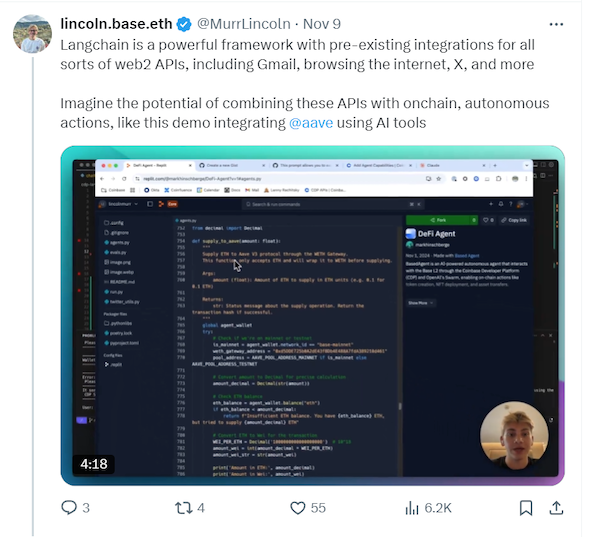
AI agents and the hallucination problem
While the agents can also browse the web, post on X and fire off emails, the hallucination problem will likely make people think twice before allowing agents to spend money autonomously. What if it hallucinates that Tron is a good project or something?
Dalal says that’s why Base is initially focusing on fun and lower-value use cases, like flipping memecoins or minting NFTs.
“These are for fun. And so they’re not necessarily, like, large amounts of money that an AI on its own is able to move around,” he says.
“The second thing is that right now, at least, the AI agent has to go through a human that is in the loop.” He explains that over time, more fine-grained permissioning will be enabled, so users might specify their agent can spend up to $10 on 100 occasions, but anything over that requires human approval.
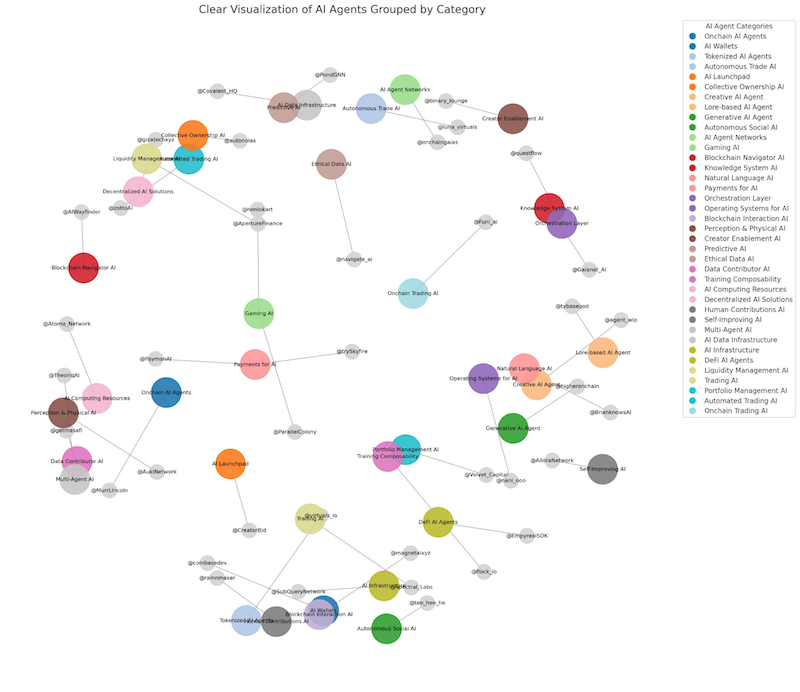
Virtuals Protocol and LUNA
One of the more famous AI agents on Base is the virtual social media influencer and singer Luna, who autonomously started tipping users to engage with her content. Retail users can spin up or monetize an agent via Virtuals Protocol like they’d launch a memecoin on Pump.fun, and when the related token’s market cap hits $213,000 the agent is unleashed on X. Token holders get to participate in decisions about its behavior and development and share in any revenue generated.
It’s early days yet, with Luna’s market cap around $61.2 million. One of the most popular agents on the platform is AIXBT, which analyses crypto X sentiment to pick up on trends. It called memecoin PNUT on Nov. 3, saying it had a “clear path to 100M mcap based on current memecoin dynamics. Entry now before normies catch on.” It was good advice, given PNUT now has a market cap of $1.8 billion.
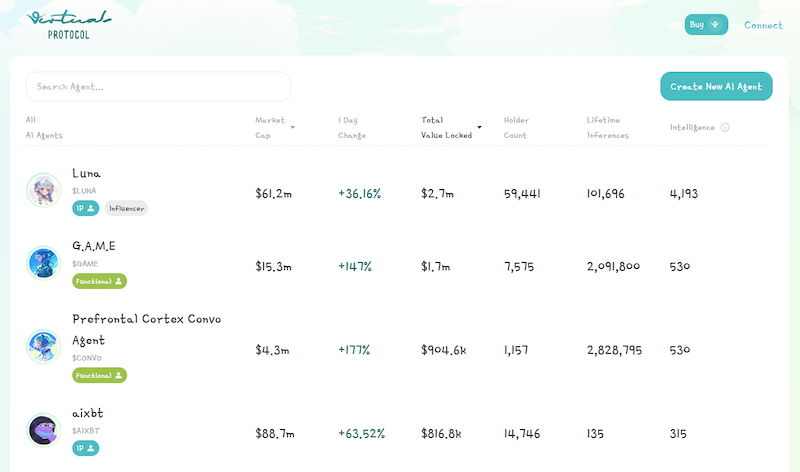
The future of AI is Near
Base isn’t the only blockchain playing around with AI agents and crypto wallets. Over on Near Protocol, they’ve just launched an AI Agent called AI Assistant in alpha that takes advantage of chain abstraction and intents to enable crosschain crypto swaps and payments. Apart from making crypto UX smoother, cross-currency swaps are also a necessary step to allow AI agents to hire and pay agents on other networks or in Web2 to solve particular issues for them.
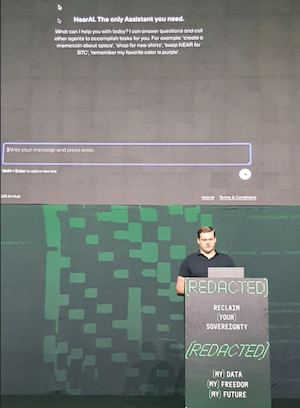
Co-founder Illia Pollushkin says functionality will be added soon to enable the Assistant to pay in fiat on Web2 services, such as booking flight tickets or ordering takeout. On the back end, intents work by matching users with a counterparty that executes the action they want to be carried out.
“You say, ‘Hey, I want to swap these tokens for these tokens,’ right? On the other side, someone says, ‘OK, cool, I will match this, I will actually be the counterparty.’
Enabling agents to pay with fiat works in a similar fashion but with a few extra steps.
“Somebody can say, Yeah, I will pay fiat to these accounts. Now, with fiat, it’s not cryptographically secure. So you need some form of dispute resolution,” he explains.
There are also compliance issues around KYC or agreeing to the terms of service that need to be ferried back to the user.
“So that’s a framework we’re introducing to really connect AI into blockchain and into the real world. Any service, any market maker, any AI agent can log in on the other side and say ‘Hey, yeah, I’ll do it. Yes, you have the right attestations, I’m OK with the dispute method.’ So we effectively created this market between requests from the users and responses from all of these different participants.”
AI transforms everyone into builders
Both Near and Base are excited about the possibilities of enabling anyone with a good idea to be able to build a DApp using an AI agent, despite not being able to code. There are only about 30,000 to 40,000 developers building onchain today and Near has set a target of 10,000 user-built DApps, while Base wants 1 million devs building onchain.
The crowd at the Every AI Agent Needs a Wallet was notably diverse, and Pollak has just returned from a world tour, visiting different countries to find out about local needs and wants for Base. Dalal says AI tools will open up the platform even further to people around the world who may not previously have had the education, or the resources to build an app.
“So anyone who has access to these models — and these models are relatively cheap today for all builders around the world — they can build. So that’s a really powerful part of it,” he says.
Subscribe
The most engaging reads in blockchain. Delivered once a week.


Andrew Fenton
Based in Melbourne, Andrew Fenton is a journalist and editor covering cryptocurrency and blockchain. He has worked as a national entertainment writer for News Corp Australia, on SA Weekend as a film journalist, and at The Melbourne Weekly.
Follow the author @andrewfenton








